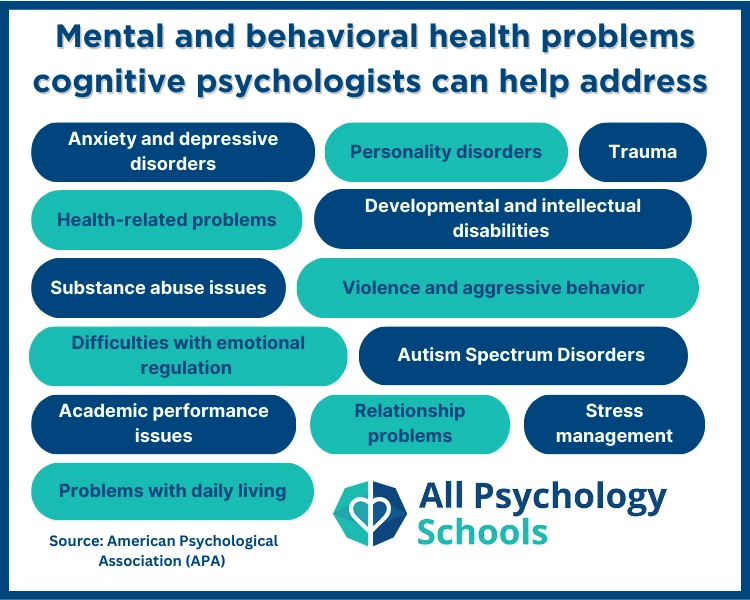Clinical Psychology Guide
- The Cost of Clinical Psychology School
- Clinical Psychology Salaries
- Clinical Psychologist Job Description
- Clinical Psychology Degree Programs
- How to Become a Psychologist
Other Careers in Clinical Psychology
Cognitive Psychology Career Overview
Learn how you can start a career in cognitive psychology.

Cognitive psychologists examine internal mental processes such as memory, perception, learning and language, and they are concerned with how people understand, diagnose, and solve problems and make decisions. These psychologists focus upon how people attain, process and recall information.
What Is Cognitive Psychology?
Cognitive psychology generally favors the gathering of empirical data from scientific research methods instead of through clinically based observation (such as in the field of psychoanalysis) to reach conclusions and state a case. However, because cognitive psychology is a vast and diverse field, clinical observation can be useful in generating hypotheses for further research.
What Do Cognitive Psychologists Do?
These psychologists perform the following duties:
- Conduct research on the human thought process
- Teach at colleges and universities
- Work at government agencies
- Work as human factors consultants or industrial-organizational managers
- Study the human brain and memory in relation to computers
- Work with Alzheimer’s or memory-loss patients
- Work with children to understand memory formation
- Teach language skills and problem-solving
- Work in the legal system and study the mental processes of criminals, witnesses, juries and judges
Problems they can address
Behavioral and cognitive psychology has been recognized by the American Psychological Association (APA) as a psychology specialty since 2000. According to the APA, these are just some of the problems that behavioral and cognitive psychology can help address.

Education
In order to practice, you’ll need to have your doctorate. A cognitive psychology PhD is an intense program and generally takes at least four to five years to complete. You will also be required to work in an internship with a qualified cognitive psychologist prior to beginning work on your own.
Courses that will pertain specifically to your degree will include cognitive learning, neuroscience, behavioral therapy, advanced social psychology and life-span development, as well as advanced research methods training that will include statistics, psychometrics and structural equations.
Work Environment
Cognitive psychologists work in many different settings, from classrooms to laboratories, government offices to neuroscience facilities. Your day will be spent working in a collaborative capacity with other psychologists of all persuasions, neuroscientists, linguists, computer scientists and other professionals who are intent on understanding how our brains function and why we learn and behave as we do.
Everything from brain imaging to psychometrics—the interpretation of quantitative tests for the measurement of intelligence, aptitude, and personality traits—will be incorporated into your daily work environment.
Cognitive Psychologist Salary
Cognitive psychologists are part of the larger field of psychologists. According to the U.S. Bureau of Labor Statistics’ current Occupational Employment Statistics, the median national annual salary for psychologists is $117,750. Actual salaries may vary greatly based on specialization within the field, location, years of experience and a variety of other factors. National long-term projections of employment growth may not reflect local and/or short-term economic or job conditions and do not guarantee actual job growth.
